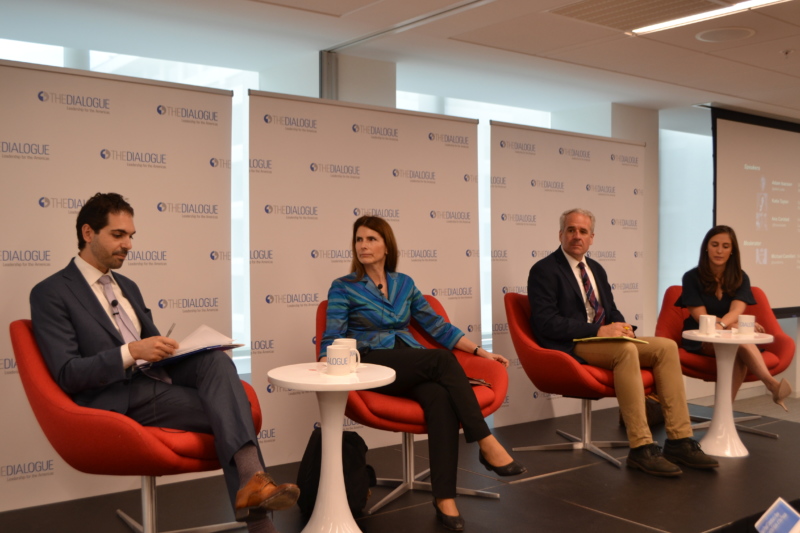Colombia-Venezuela Relations: What Are the Prospects?
Colombia and Venezuela have a history of rocky relations characterized by short bursts of improvement and deterioration.
On June 28, the Inter-American Dialogue hosted an event titled “Duque’s Peace? Colombia’s New President and the Future of the Peace Process” featuring photos from the series “Peace Football Club” by the World Press Photo Exhibition. This discussion, moderated by Michael Camilleri, Director of the Peter D. Bell Rule of Law Program at the Inter-American Dialogue, featured speakers Ana Caridad, Program Associate in the Latin American and Caribbean Program at The Carter Center; Adam Isacson, Director of Defense Oversight at the Washington Office on Latin America; and Katie Taylor, Executive Director at the Pan-American Development Foundation. The conversation analyzed what the election of Iván Duque means for the 2016 Colombian peace deal, the signature achievement of Juan Manuel Santos’s presidency.
“Although the cease-fire with FARC had almost no violations, the window of opportunity for the Colombian government is closing. There is still no agreed plan for collective reintegration.“ @adam_wola #DuquePeaceProcess pic.twitter.com/6vlGfqWhlr
— The Inter-American Dialogue (@The_Dialogue) June 28, 2018
Given that over 70% of Colombians think the peace process is going poorly, Camilleri began by asking the panelists to provide their assessments of the peace accords. Isacson identified disarmament and the orderly fulfillment of aspects of the peace process as its key achievements. However, he expressed concern that the Colombian government has proceeded slowly with plans for collective reintegration, potentially allowing new groups to come into areas that the FARC have left. As for what changes to expect from the president-elect, Isacson indicated that the peace accords are not likely to be scrapped entirely, but that Duque and the Centro Democrático will “bend it as much as they can without breaking it.” Ideally, the government would address conditions in the countryside by complying with the coca-crop substitution accord, though Isacson does not see that happening under Duque; during his campaign, Duque called for the reimplementation of a large-scale fumigation program which was suspended in 2015.
Camilleri then turned the conversation to the judicial aspects of the peace agreement, noting that there have already been resignations in the Special Jurisdiction for Peace (SJP)—the entity created to charge FARC members and state security officials. When asked about the possible implications of moving the SJP into ordinary judicial proceedings, Caridad stated that obstacles including a significant backlog would prevent victims from getting the justice they were promised. Looking ahead to potential changes to the peace process under Duque, Caridad indicated that political participation is one area where the FARC might be willing to negotiate, though “the hardline is going to be with extradition.” To improve implementation of the peace process, Taylor called for increased “clarity of action” at the local level. When discussing opportunities for further involvement in the peace process, Taylor indicated that the U.S. could help Colombia deal with mounting debt from investment in the peace process, a drop in oil prices, and decreased production levels.
“The Special Jurisdiction for Peace has only implemented about 3% of the provisions. This really prevents victims from receiving justice.” @Anacaridads #DuquePeaceProcess pic.twitter.com/omA1ROAMZi
— The Inter-American Dialogue (@The_Dialogue) June 28, 2018
The event concluded with a Q&A in which audience members asked about peace districts, the role of Gustavo Petro supporters during Duque’s presidency, and the issue of corruption in Colombia. Voted down in 2017, the 16 peace districts would have allotted seats in congress to organizations representing victims from areas affected by guerilla violence. Caridad suggested that increased FARC dissidence would result if further political reform—like Centro Democrático’s request to strip FARC of its party status—were enacted. On the question of Petro supporters, the panelists indicated that the opposition lacks the representation in government necessary to halt Duque’s plans entirely. Regarding corruption, Isacson held that Duque will have to make an effort to distance himself from his party’s history of collusion with organized crime. In their final thoughts, Taylor and Caridad remained hopeful for the future of Colombia’s peace process, while Isacson feared a growing divide between the country’s urban and rural populations.
Colombia and Venezuela have a history of rocky relations characterized by short bursts of improvement and deterioration.
On August 7, an important chapter in Colombian-Venezuelan relations that has coincided with the presidencies of Alvaro Uribe and Hugo Chavez will come to an end. These last eight years have been a rollercoaster, with moments of great tension but also occasional pragmatism.
After decades of violence, peace remains a coveted yet elusive goal in Colombia.
 Irene Estefania Gonzalez / Inter-American Dialogue
Irene Estefania Gonzalez / Inter-American Dialogue